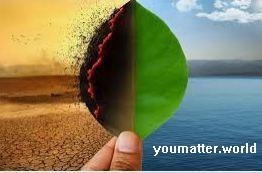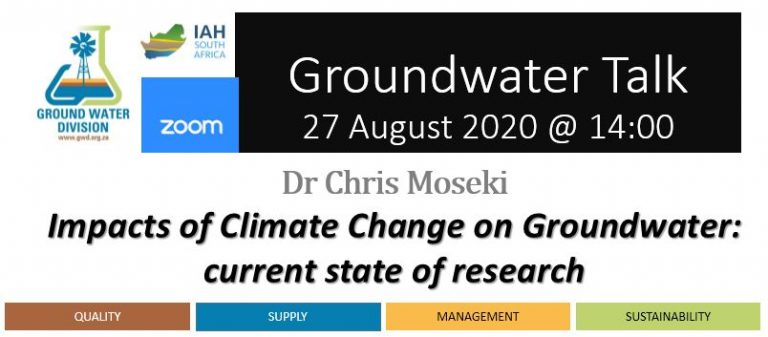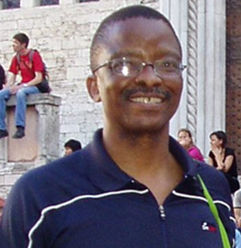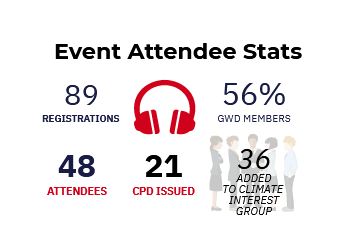Event Debrief: Impacts of Climate Change on Groundwater: current state of research (GWD GAU)
Event Debrief: Impacts of Climate Change on Groundwater: current state of research (GWD GAU)

SACNASP CPD EVENT

Talk Abstract:
It’s commonly accepted that climate change will be experienced through water, particularly in developing countries. Several studies relating to the impacts of climate change on surface water have been undertaken while very little research exists on the potential impacts on groundwater. Hence, this talk aimed to discuss some of the current research with respect to climate impacts on groundwater. Various methods are proposed for estimating climate change impacts on groundwater, such as using hypothetical scenarios of progressive drying to assess streamflow sensitivity to drought, using MODFLOW to investigate projected effects of climate change on groundwater, or using scenarios to analyze impacts of climate change on aquifer recharge.
 About the speaker:
About the speaker:
Chris Moseki has over 20 years of experience in groundwater development and water resources management. He also served as a research manager at the Water Research Commission responsible for the development of tools and systems for adaptation to climate change for about 6 years. Chris is currently a climate change specialist scientist at the Department of Water and Sanitation. His interest includes research in groundwater and climate change as well as seeking solutions to climate and water-related problems in the public sector. Dr Moseki is also a longstanding member of the GWD and is revered and highly regarded. He has been instrumental in establishing WRM and Climate Change as Agenda points in the water sector strategies being work-shopped since the late 1990's, and driving forth and carrying the torch since then...And a great person with a warm smile. We appreciate you Dr. Chris & also for sharing your knowledge, experience, and material with us!
Well done and Thank you to the GWD Gauteng Branch Chair Mr. Kwazi Majola for making the sharing & learning opportunity through this excellent presentation possible.
Q & A Session
The following were discussed:
Kes Murray Q: With all the increases in GW use (and dependence) in recent years in RSA, as well as with the expected reductions in recharge from climate change in the future, what is DWS's role with regards to monitoring, managing, and allocating the status of aquifer storage levels at a regional scale?
Victor Tibane Q: What are the differences between water stress and water scarcity, how is each event determined, and what are the possible technological advances for solutions?
Elsabe Swart, Department of Environment and Nature Conservation (DENC) Q_1: How do you distinguish between water extraction impacts and that of climate change?
Q_2: How do you distinguish between water extraction impacts and that of climate change?Are any of these studies being done in the Northern Cape province? Is monitoring of boreholes sufficient (especially in the Northern Cape as it is the most arid province where these impacts are expected to be most severe)?
Q_3: What communications go through to the National Minister - concern is specifically i.t.o. the pressure to extract more underground water as a source for water going forward in the country. Concerned about the feasibility overall, but again especially i.t.o. the arid Northern Cape?
Henk Coetzee Q: Chris, have you looked at Eddie van Wyk's work on recharge, which looked at recharge being strongly event-driven, especially in more arid areas?
Sonia Veltman Q: I'd like to add to Henk's question. What are the options for looking at event-driven recharge, modelling these based on changes in expected higher rainfall events, and then taking those numbers back to these models adding it as objects, instead of averaging. What we see in the field is rapid recharge during storm events, but lagged in time?
Comment by Mr. Fanus Fourie: The issue around low rainfall vs high-intensity rainfall events will average out. Eddie said that the duration of the rainfall event is very critical to allow recharge to happen. Quick and intense thunderstorms will not create recharge but runoff.
Sivashni Naicker Q_1: The areas highlighted within the Karoo that are high risk, are there any management interventions that can be included in planning that DWS can do, especially in the rural setting, whereby people are more vulnerable?
Q_2: Dr Moseki, should we add an investigation of potential artificial recharge sites to our all towns/recon studies?
Comment by Dr Sumaya Israel: I agree with you Dr Moseki, monitoring and having reliable data is key to sustainable management and understanding of our hydrological and hydrogeological systems.
Nkadimeng Maletele (IUCMA) Q: Thank you very much for the lovely and educational presentation Dr. Moseki, As a new member of the groundwater studies family I would like to ask, after how many years is it effective to analyze groundwater quality and quantity data…And is the groundwater quality data important when quantifying the impacts of climate change on groundwater?
Thank you for your support in attending this event.
